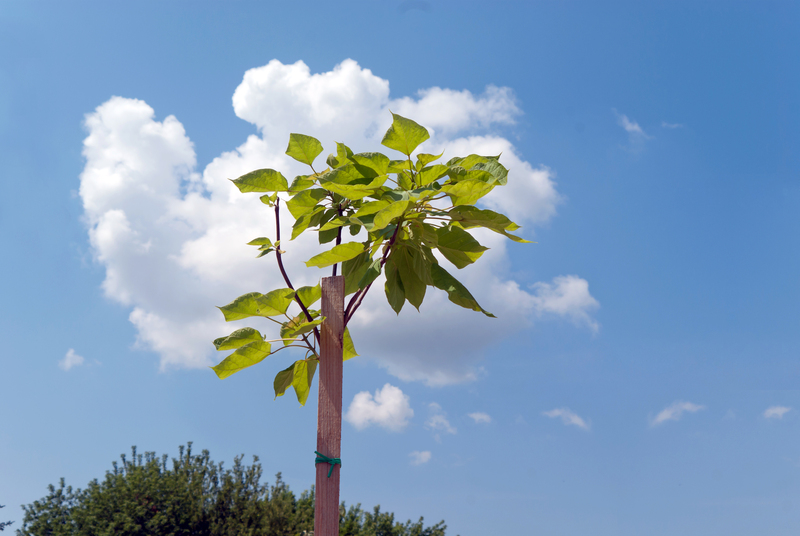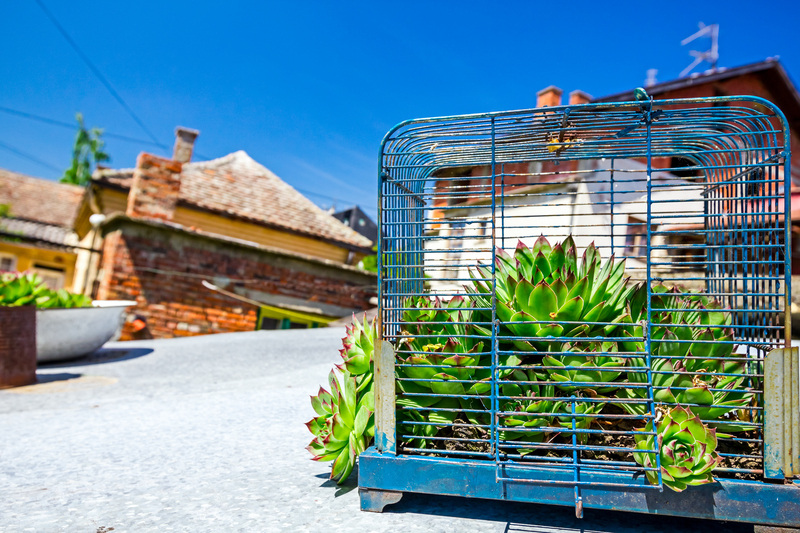Soil Enrichment: The Eco-Friendly Transformation of Organic Waste
Posted on 11/06/2025
Soil Enrichment: The Eco-Friendly Transformation of Organic Waste
Soil enrichment stands at the intersection of sustainable agriculture, waste management, and environmental stewardship. By transforming organic waste into nutrient-rich materials, we not only curtail landfill usage but also mobilize a circular economy that benefits both the planet and its people. This comprehensive article explores various dimensions of eco-friendly soil enrichment using organic residues, providing actionable insights and answering your most pressing questions about turning waste into soil wealth.
Understanding Soil Enrichment and Its Importance
Before delving into the process and benefits, it's crucial to understand what soil enrichment truly means. This practice involves adding organic or inorganic materials to soil to improve its fertility, structure, and ability to retain water and nutrients. When we focus on eco-friendly soil enrichment, we emphasize natural soil enhancers derived from organic waste sources such as kitchen scraps, yard trimmings, animal manure, and agricultural byproducts.
Why Is Soil Enrichment Essential?
- Rejuvenates Depleted Soils: Intensive agriculture often strips soils of vital nutrients, leading to decreased fertility. Enrichment restores balance.
- Reduces Landfill Waste: Organic waste constitutes a significant portion of landfill mass and leads to harmful methane emissions.
- Promotes Carbon Sequestration: Healthy soils act as carbon sinks, mitigating climate change.
- Supports Microbial Life: Organic amendments bolster soil biodiversity, crucial for nutrient cycling and disease suppression.
- Enhances Water Retention: Improved soil structure reduces run-off and enhances drought tolerance.
By engaging in eco-friendly soil enrichment, communities and farmers alike can build a resilient foundation for sustainable food production and environmental health.

The Journey of Organic Waste: From Trash to Treasure
Organic waste transformation is the backbone of sustainable soil enrichment. Instead of relegating banana peels, coffee grounds, or grass clippings to the trash, these materials are intercepted and processed to rejuvenate the earth.
Types of Organic Waste Used for Soil Enrichment
- Kitchen scraps: Vegetable peels, fruit rinds, eggshells, tea leaves, and coffee grounds.
- Yard waste: Leaves, grass clippings, small branches, and garden debris.
- Animal manure: Rich in nitrogen, commonly sourced from cows, chickens, horses, and sheep.
- Agricultural residues: Straw, husks, shells, and crop leftovers.
- Food industry byproducts: Brewery waste, spent grains, and pressed fruit pulp.
Properly transformed, these organic materials become potent soil improvers that nourish plants and foster strong ecosystems.
Composting: The Heart of Eco-Friendly Soil Enrichment
At the core of organic waste transformation is composting--a natural process wherein microorganisms decompose organic matter into a stable, dark, and earthy-smelling substance called compost.
How Does Composting Work?
- Collection: Gather green (nitrogen-rich) and brown (carbon-rich) organic materials.
- Shredding and Mixing: Smaller pieces and blended components accelerate breakdown.
- Moisture Control: Maintaining moisture akin to a wrung-out sponge supports microbial activity.
- Aeration: Regular turning introduces oxygen, vital for aerobic decomposition.
- Maturation: Finished compost stabilizes and becomes safe for garden use after several weeks to months.
Composting not only recycles food and yard waste but also curbs greenhouse gas emissions compared to landfilling. As a natural fertilizer, compost enhances soil's biological, chemical, and physical properties--making it central to organic soil enrichment practices.
Popular Composting Methods
- Backyard composting: Simple piles or bins suitable for households.
- Vermicomposting: Earthworms accelerate decomposition, producing nutrient-rich castings.
- Bokashi fermentation: An anaerobic process using beneficial microbes to rapidly ferment all food waste, including meats and dairy.
- Industrial/municipal composting: Large-scale facilities handle greater volumes and can process diverse organic matter.
The Science Behind Organic Waste Soil Enrichment
Nutrient cycling is fundamental to how organic waste transforms soils. When organic materials break down, nutrients like nitrogen, phosphorus, and potassium are released in plant-available forms. Furthermore, compost infuses soils with humus--a stable organic matter that enhances soil's structure and health.
Key Soil Benefits from Enriched Organic Matter
- Improved Fertility: Organic waste provides slow-release nutrients, supporting longer-lasting plant health.
- Enhanced Soil Texture: Compost increases granular structure, preventing compaction and promoting root growth.
- Greater Water Retention: Enriched soils hold water like a sponge, reducing watering needs and runoff.
- Stimulated Microbial Life: Beneficial fungi and bacteria foster nutrient cycling and suppress soilborne diseases.
What distinguishes organic soil enrichment from chemical fertilizer use is the holistic improvement it imparts--not only boosting nutrients but also fostering entire soil ecosystems.
The Environmental Impact of Transforming Organic Waste into Soil Enrichment
The environmental benefits of eco-friendly soil enrichment are vast. When organic waste is composted and reused:
- Landfill dependency drops: Less organic matter in landfills dramatically cuts methane emissions--a potent greenhouse gas.
- Carbon sequestration rises: Organic matter helps soils lock away atmospheric carbon, mitigating climate change effects.
- Cleaner water environments: Enhanced soils filter pollutants, reducing agricultural runoff and protecting waterways.
- Biodiversity strengthens: Compost and organic matter support a robust web of soil life, from microbes to earthworms.
Thus, soil enrichment via organic recycling represents a keystone solution at the nexus of agriculture and environmental care.
Eco-Friendly Soil Enrichment at Home and in the Garden
How Homeowners Can Turn Organic Waste into Gardening Gold
- Start a compost bin: Even in small yards or apartment balconies, compact compost bins can process kitchen scraps and yard clippings.
- Practice vermicomposting: Keep a worm bin indoors to manage food scraps and generate rich worm castings for houseplants or vegetables.
- Utilize leaf mold: Stack and dampen fall leaves to create an excellent mulch and soil improver after 6-12 months.
- Apply finished compost: Incorporate mature compost into planting beds, lawns, or as a topdressing to nourish the soil naturally.
Home soil enrichment not only cuts household waste by up to 40% but also yields cost-effective, chemical-free fertilizers while nurturing vibrant plants and flowers.
Community and Urban Initiatives
- Neighborhood composting programs: Shared bins or pickup services recycle local organic waste and return compost to participants or urban gardens.
- Citywide green waste diversion: Municipalities collect yard and food waste, producing large quantities of soil amendments for parks and landscaping.
- School and workplace education: Composting projects educate new generations about sustainability while improving campus gardens.
Soil Enrichment Best Practices for Farms and Large-Scale Operations
Integrating Organic Waste into Sustainable Agriculture
- On-farm composting: Farms can process animal manure, crop residues, and green waste into custom blends tailored for field application.
- Cover cropping: Growing and later incorporating cover plants (like clover or vetch) provides "green manure," enhancing soil nitrogen content.
- Crop rotation: Alternating crops breaks pest cycles and optimizes nutrient usage, especially when paired with organic soil transformers.
- No-till practices: Minimal disturbance conserves organic matter, while surface-applied compost feeds soil from the top down.
These approaches not only optimize yields and reduce input costs but also build long-term soil health and safeguard surrounding ecosystems.
Challenges in the Eco-Friendly Transformation of Organic Waste
While the benefits are clear, organic soil enrichment does pose challenges:
- Contamination: Plastics, chemicals, or non-compostable items must be kept out of the waste stream.
- Odor and pest control: Poorly managed compost can attract vermin or produce foul smells.
- Pathogen and weed seed kill: Compost piles must reach sufficient heat to neutralize unwanted organisms.
- Scaling up: Large volumes require infrastructure, labor, and ongoing management.
With robust systems, education, and community engagement, these obstacles can be overcome, enabling us to realize the full potential of eco-friendly soil enhancement.
Frequently Asked Questions about Organic Waste Soil Enrichment
Is all organic waste suitable for soil enrichment?
While most plant-based materials are excellent, avoid glossy papers, disease-infected plants, persistent weeds, and large volumes of meat or dairy unless using specialized composting (like bokashi or industrial methods).
How long does it take for organic waste to transform into usable soil improver?
Depending on method and management, home composting takes 2-9 months. Hot piles and vermicomposting work faster; turning and balancing moisture/composition accelerates the process.
Does using compost and organic amendments attract pests?
Proper compost management (covering food scraps, mixing greens and browns, and ensuring aeration) minimizes odor and pest risks. Rodents are discouraged by not including meat, dairy, or oily foods in home piles.
What are the best practices for maximum soil enrichment?
- Maintain a 2:1 ratio of brown-to-green material for balanced decomposition.
- Chop or shred large pieces to facilitate quicker breakdown.
- Keep piles moist but not soggy, and turn weekly to add air support.
- Monitor temperature--hot piles (130-160?F) kill weeds and pathogens most effectively.
- Test finished compost by earthy smell, crumbly texture, and absence of recognizable debris.
Future Innovations in Organic Waste Transformation and Soil Enrichment
Exciting new technologies are emerging to advance soil enrichment:
- Biochar: Charred organic matter added to soil increases carbon capture and enhances nutrient retention.
- Community-scale digestion: Anaerobic digesters produce both biogas for energy and nutrient-rich digestate for agriculture.
- Smart composting systems: Automated sensors streamline compost management, ensuring optimal conditions for rapid transformation.
- Fungal bioremediation: Mycorrhizal fungi amendments further boost plant nutrition and resistance to stress.
These breakthroughs promise to further integrate eco-friendly waste recycling with modern soil management, closing resource loops for healthier communities and a greener planet.

Conclusion: The Path to Regenerative Soil
The eco-friendly transformation of organic waste into soil enrichment is a win-win for food security, environmental protection, and climate action. Whether at home, in community gardens, or across commercial agriculture, embracing organic waste recycling for soil:
- Slashes landfill impact and greenhouse gas emissions
- Builds resilient and fertile soils for generations
- Encourages biodiversity and ecosystem balance
- Empowers a circular, sustainable economy
By making composting and other organic recycling methods a staple of modern living, we unlock nature's time-honored solution for restoring the earth--starting right beneath our feet. Soil enrichment with organic waste puts us on the path to thriving, regenerative landscapes and a cleaner, brighter future.
Start Your Soil Enrichment Journey Today!
- Begin composting your kitchen and yard waste.
- Support local and municipal organic recycling programs.
- Educate your neighborhood about the eco-friendly transformation of organic waste.
- Advocate for policies that promote soil health and sustainable waste management.
Harness the power of organic waste soil enrichment--and witness your garden, community, and planet flourish!
Latest Posts
Designing Engaging and Imaginative Gardens for Children
Vertical Gardening: Harmony in Small Spaces
Design a Carefree Garden: 5 Budget-Friendly Ideas

